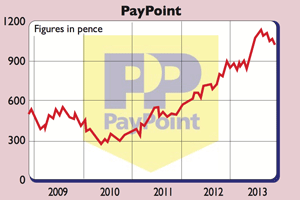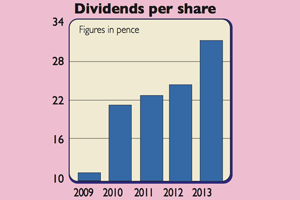Shares in focus: Should you withdraw your cash from PayPoint?
PayPoint is a great business, but can the ATM provider keep on growing? Phil Oakley investigates.
Get the latest financial news, insights and expert analysis from our award-winning MoneyWeek team, to help you understand what really matters when it comes to your finances.
You are now subscribed
Your newsletter sign-up was successful
Want to add more newsletters?

Twice daily
MoneyWeek
Get the latest financial news, insights and expert analysis from our award-winning MoneyWeek team, to help you understand what really matters when it comes to your finances.

Four times a week
Look After My Bills
Sign up to our free money-saving newsletter, filled with the latest news and expert advice to help you find the best tips and deals for managing your bills. Start saving today!
The ATM provider has done well, but the good times are over, says Phil Oakley.
PayPoint's shares have more than tripled in value in the last three years. It has come a long way since it started out in Northern Ireland in 1996 as a way for people to pay utility bills in local shops. By the following year, it had expanded to 1,000 outlets.
The company has seen stellar sales and profit growth over the last 15 years as more companies have signed up to its services and the number of shops with terminals has grown. It can now be found in over 25,000 convenience stores in Britain and Ireland.
MoneyWeek
Subscribe to MoneyWeek today and get your first six magazine issues absolutely FREE

Sign up to Money Morning
Don't miss the latest investment and personal finances news, market analysis, plus money-saving tips with our free twice-daily newsletter
Don't miss the latest investment and personal finances news, market analysis, plus money-saving tips with our free twice-daily newsletter
Customers can use its terminals to pay bills, top up mobile phones, transfer money, buy their TV licence and withdraw cash.
PayPoint aims to grow by embracing the internet and mobile-phone technology. It's offering online payment facilities for retailers, a parcel collection and returns service, and the ability to pay for parking with your mobile.
In 2007, it entered Romania, where it has more than 8,000 outlets and is growing strongly. Its shares are now richly valued by the stock market. Can it keep on growing profits to justify its high price tag, or should you look for better value elsewhere?
How's business?
return on capital employed (ROCE)
But can the good times last? Management thinks it can keep growing profitably in the UK and Romania. Romania should grow due to favourable demographics for in-shop bill payments and a younger business. However, recent figures suggest business is tough in Britain.
PayPoint's bread and butter remains bill payments in shops. This hasn't grown much this year, but the gas and electricity companies are still installing pre-payment meters, which suggests this income stream should be robust. The expansion of convenience stores by the major supermarkets is also helpful.
Can it keep pulling in revenue?
UK top-ups through PayPoint have fallen by nearly 20% this year and will probably keep falling. PayPoint is also making less money from ATMs as fee payments from the Link network have been reduced.
There are signs that momentum is slowing. To its credit, PayPoint has pointed out that profits so far this year have been flattered by delayed spending on IT and marketing.
It has also benefited from lower commission payments to retailers, which will even out in the future. Revenue hardly grew at all, and probably by no more than inflation when adjusted for fewer trading days.
New sources of growth?
PayByPhone allows people to pay for car parking using a mobile app. From my experience I would say this is a great service with lots of potential for other uses and has already been used with taxis.
PayPoint has been signing up local councils, as well as customers in America, France and Canada. Revenues have been growing strongly but are not yet big enough to affect profits. There's also competition in this area from RingGo and Parkmobile.
Collect+, a joint venture with Yodel for parcel collections and returns, could be interesting. People have embraced internet shopping, but there's always the problem of not being in when your goods are delivered and the hassle of returning them.Collect+ allows collection and returns at PayPoint retailers.
The venture has just started making profits and could be a success if the growth of click and collect with many retailers is anything to go by.
However, at over 20 times next year's forecast earnings, there's no room for profits slowing down or for the new ventures taking longer to take off. At 15 times earnings, I'd be inclined to be more charitable. Currently the shares look like a risky proposition, so it might be time to cash out.
Verdict: sell


Directors' shareholdings
Get the latest financial news, insights and expert analysis from our award-winning MoneyWeek team, to help you understand what really matters when it comes to your finances.
Phil spent 13 years as an investment analyst for both stockbroking and fund management companies.
-
 Can mining stocks deliver golden gains?
Can mining stocks deliver golden gains?With gold and silver prices having outperformed the stock markets last year, mining stocks can be an effective, if volatile, means of gaining exposure
-
 8 ways the ‘sandwich generation’ can protect wealth
8 ways the ‘sandwich generation’ can protect wealthPeople squeezed between caring for ageing parents and adult children or younger grandchildren – known as the ‘sandwich generation’ – are at risk of neglecting their own financial planning. Here’s how to protect yourself and your loved ones’ wealth.
